Indonesia Elections 2024: Why cigarette and coffee sales spike as voters assess candidates
Indonesians will head to the polls on Feb 14, and some sectors have already benefited from the campaign season.
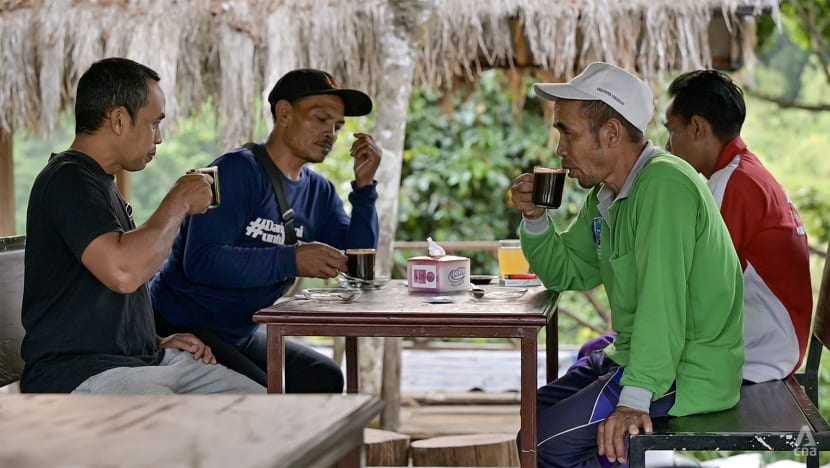
During Indonesia's election season, there is usually an increase of demand for cigarettes and coffees. (Photo: CNA/Danang Wisanggeni)

This audio is generated by an AI tool.
SIDOARJO, East Java: It was a weekend, but Mdm Rosalina had no time to relax as she was still busy overseeing cigarette production at her factory PT Mustika Tembakau Indonesia.
Whenever elections are around the corner, there is a high demand for cigarettes.
Thus, as Indonesia is currently gearing up for its upcoming elections on Feb 14, Mdm Rosalina wants to ensure she can meet the demand.
“The demand starts to increase during the campaign season,” said Mdm Rosalina, who goes by one name.
“And it will last for a few months,” she told CNA at her factory located in Sidoarjo, East Java, which produces cigarettes under brands such as Mustika Orange and Mustika Gold.
Mdm Rosalina has already seen an increase of about 10 per cent in demand for her cigarettes since campaigning started in November compared to regular months.
When it is not election season, she usually produces about 400 boxes of cigarettes per week, but now about 500 boxes.
One box contains about 500 packs of cigarettes, she said.
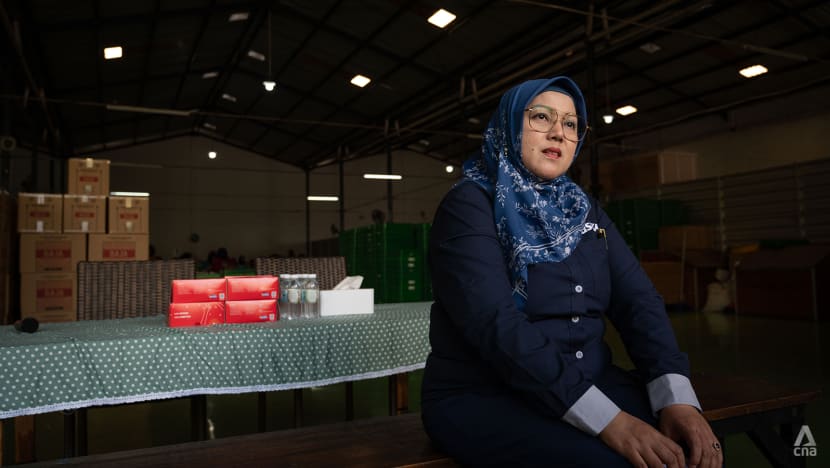
Every time Southeast Asia’s biggest economy heads to the polls, the government predicts the country’s economy will also grow.
“There will be a positive impact from the upcoming elections,” said the governor of Bank Indonesia Perry Warjiyo, during a press briefing on Dec 21.
An economist says this is because many items usually experience an increase in demand and profit during election seasons.
“Sectors that are positively impacted include food and beverage, telecommunications, transportation and domestic manufacturing,” said Mdm Dian Ayu Yustina, an economist with Bank Mandiri, Indonesia’s largest bank.
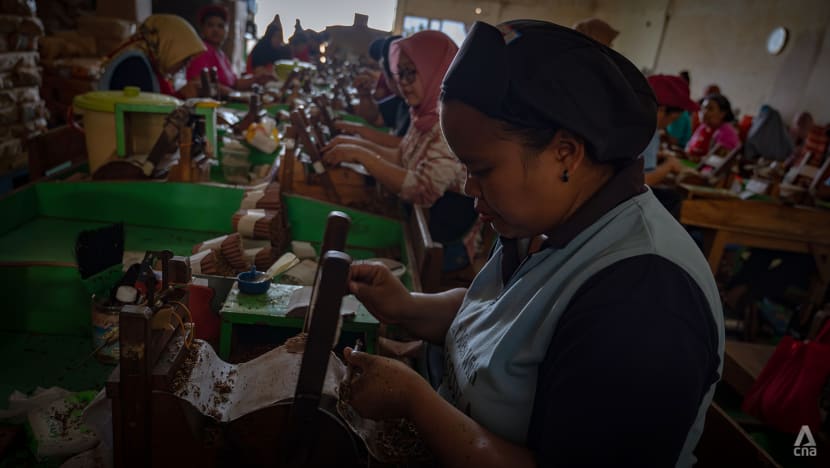
WHY DEMAND IS UP
Mr Adik Dwi Putranto, head of East Java’s chamber of commerce and industry, said the demand for items such as cigarettes increases during the campaign period leading to the elections because there are usually many gatherings.
“It is a habit of Indonesians to gather because candidates want to promote their agendas.
“And some of the things usually served during such gatherings are cigarettes,” Mr Adik told CNA.
Another item is coffee, he added: “Because cigarettes are consumed together with coffee. If you smoke but don’t drink coffee, it does not feel quite right.”
Indonesia’s previous presidential election was in 2019.
During the campaign season, which started from September 2018 until April 2019, cigarette production averaged about 29.6 billion sticks monthly, according to data from Indonesia’s customs and excise agency. The agency is under the ministry of finance.
This is higher than during the same period the previous year, which recorded 24.36 billion sticks per month.
According to data from the ministry of agriculture, during the 2019 election year, about 335,540 tons of coffee were consumed compared to 314,365 tons in 2018.
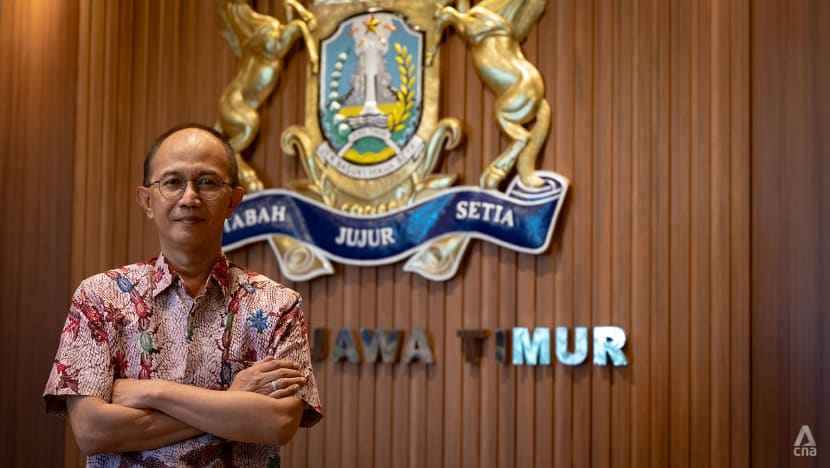
Mr Adik claimed that business people hope the elections will affect the economy positively because individuals and political parties are known to spend a lot during campaigning.
Mr Triyono Prijosoesilo, head of Indonesia’s soft drink industry association (ASRIM), also hopes the elections will positively impact the soft drink industry.
“In previous elections, there was indeed an increase in sales during campaigning,” he said, unable to give exact figures.
“And this year, it is unique because there will also be local elections (in November).
“But we think the biggest positive impact will be from the presidential election because it is bigger.”
The Indonesian Election Commission (KPU) on Jan 14 released the initial campaign funds of the political parties.
It shows that the ruling party, The Indonesian Democratic Party of Struggle (PDI-P), has the biggest budget with 183 billion rupiah (US$11 million) out of the 18 political parties contesting nationally, followed by the Indonesian Solidarity Party (PSI), which has a budget of 33 billion rupiah.
As of mid-January, PDI-P has spent 115 billion rupiah, while PSI 24 billion rupiah.
HOW IT AFFECTS THE ECONOMY
Speaking at a press briefing on Dec 21, Governor of Bank Indonesia Perry Warjiyo claimed a contributing factor to the country’s economic growth this year will be the upcoming presidential and legislative elections.
While Indonesia’s economy grew 5.05 per cent in 2023, he forecasted Indonesia’s economy this year will grow up to 5.5 per cent year on year.
There are three pairs of presidential and vice-presidential candidates running for the election.
They are former Jakarta governor Anies Baswedan and his running mate Muhaimin Iskandar, who heads the Islamic-leaning National Awakening Party (PKB); defence minister Prabowo Subianto and Solo mayor Gibran Rakabuming Raka, who is also son of President Joko Widodo; former Central Java governor Ganjar Pranowo and Mahfud MD, who on Feb 1 resigned from his position as the country's coordinating minister for political, legal and security affairs.
According to the election law, a pair must secure more than 50 per cent of the votes to win.
Out of those 50 per cent, a pair must have at least 20 per cent of votes in more than half of the 38 Indonesian provinces.
If no pair meets the requirements, the two pairs with the most votes will go into a second round of voting in June.
Bank Indonesia’s deputy governor Aida Budiman said at the same press conference that the elections would increase economic growth from domestic consumption, which is the main driver of Indonesia’s economy.
She added that domestic consumption would stem from not only household spending but also government spending to finance technical needs related to holding the elections, such as procuring ballot boxes and vehicles to transport the logistics. Typical household consumption would be food and beverages.
“If there are two rounds, maybe there could be an addition of around 0.6 per cent growth to household consumption,” she stated.
Mdm Aida even noted that the impact of the upcoming elections was already felt at the end of 2023, as campaigning started in November.
“The impact was already felt in 2023 because preparations were already in the lead-up to the elections.
"However, a bigger impact will be felt in 2024," said Aida, without revealing details.
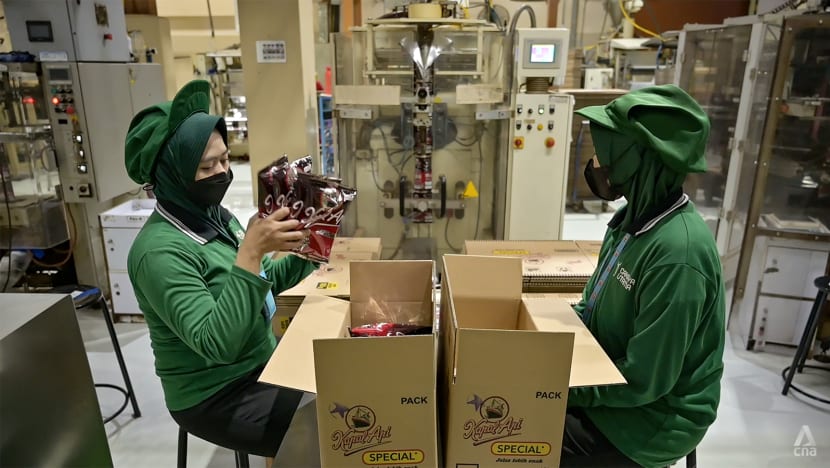
BUSINESSES RAMPING UP PRODUCTION
Mdm Rosalina, the owner of cigarette company Mustika Tembakau Indonesia, said that during previous elections, demand for her products increased by 30 per cent.
However, she stated it is not always easy to meet the demand.
“We may have problems obtaining the material, such as getting enough tobacco, which hampers our production,” she said.
This time, she has tried to preempt it by securing as much tobacco as possible before campaigning started in November.
Deputy Health Minister Dante Saksono said in June last year that the number of Indonesian smokers has been on the rise.
Indonesia has the third highest number of smokers worldwide after China and India, with about 112 million smokers, according to government data.
"We are in third place, maybe because we are also a tobacco-producing country," said Mr Dante last June.
The government has tried for years to dissuade people from smoking as it has negative health consequences, such as the risk of contracting tuberculosis or cancer.
But it has been a double-edged sword as the country gets about 10 per cent of its state revenue from the tobacco products industry.
Mdm Rosalina believes that smokers should know the health consequences as they are stated on the cigarette packs.
“The consequences are on the package. So that is already a reminder - it all depends on the consumer whether they want to consume (the cigarette) or not.
“Cigarettes greatly contribute to the country’s income,” she added.
East Java province is the main producer of cigarettes in Indonesia.
Mdm Sulami Bahar, the head of East Java’s cigarette entrepreneur (Gapero) association, said that legislative candidates even make special requests to small-scale cigarette factories during elections.
“They want us to create cigarette packs with their pictures on them to distribute to potential voters.”
As a cigarette producer herself, she has also received such requests this time.
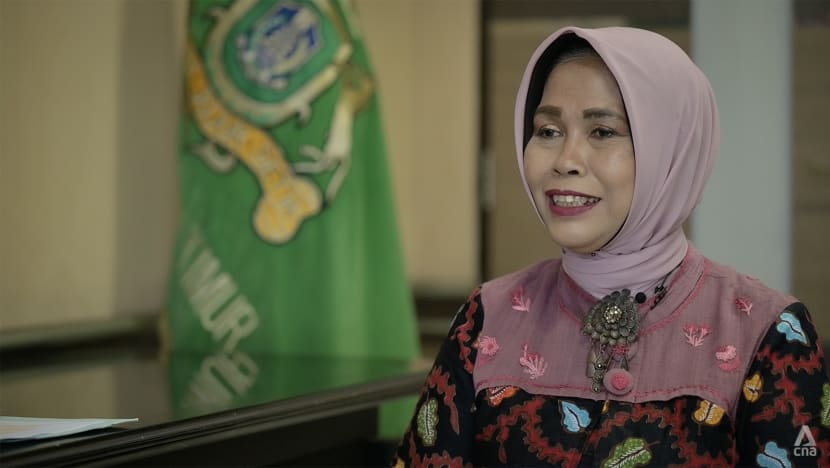
Meanwhile, coffee farmer and producer Tarmuji in Pasuruan, East Java, also claimed that during previous elections, his locally-made coffee Alas Pinggan saw an increase in sales of up to 30 per cent from usually 350 tonnes per year.
“When there is higher demand, we farmers must plant more coffee to supply more,” said Mr Tarmuji, who goes by one name.
He runs his small-sized coffee enterprise with other farmers, and during the last election in 2019, they gained about 7.2 billion rupiah per year.
This time, as of January, they have seen an increase of 10 per cent in sales but are not yet able to calculate how much they have profited.
Mr Tarmuji said their main challenge is limited access to capital and fertilisers to increase sales.
Unlike Alas Pinggan coffee, the sales of Kapal Api, Indonesia’s leading instant coffee producer, were not affected by elections in previous years.
“I think because people don’t consume that much coffee daily and due to the health factor (of instant coffee) such as gastric acid,” said PT Kapal Api Global's chief marketing officer Christeven Mergonoto.

However, he does hope they will be able to profit from the elections this year.
“During this time, we hope the candidates' campaigns will increase coffee consumption in Indonesia.”















